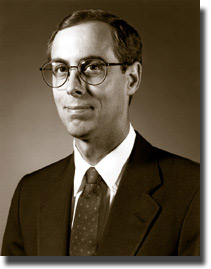At 28, James H. Ross was already sitting
in the executive chair. His graduate school residency led him to becoming
the administrator of a community hospital in Dallas. Not just any hospital,
but one which had recently filed for bankruptcy.
![]() “The
problems were just coming 90 miles an hour,” Ross remembers. “The
employees were absolutely terrified about what was going to happen with
them and medical staff was all torn asunder. It was, in some ways, just
the worst of times you could possibly imagine.”
“The
problems were just coming 90 miles an hour,” Ross remembers. “The
employees were absolutely terrified about what was going to happen with
them and medical staff was all torn asunder. It was, in some ways, just
the worst of times you could possibly imagine.”
![]() His
experience showed Ross the power of community. When Methodist Hospital,
where Ross was completing his graduate residency, bought the ailing center
and reorganized it, the board of trustees, employees and medical staff
pulled together and brought the institution back to life.
His
experience showed Ross the power of community. When Methodist Hospital,
where Ross was completing his graduate residency, bought the ailing center
and reorganized it, the board of trustees, employees and medical staff
pulled together and brought the institution back to life.
![]() Leaving
that hospital was one of his hardest decisions, yet he won the chance
to serve a community again when he arrived in Greenville in 1990. Ross,
who arrived as chief operating officer, came from St. Luke’s Episcopal
Hospital, a 950-bed center affiliated with the Texas Heart Institute.
It is known for its heart surgery, neurology and other programs. After
visiting PCMH once, he knew he’d found a special place.
Leaving
that hospital was one of his hardest decisions, yet he won the chance
to serve a community again when he arrived in Greenville in 1990. Ross,
who arrived as chief operating officer, came from St. Luke’s Episcopal
Hospital, a 950-bed center affiliated with the Texas Heart Institute.
It is known for its heart surgery, neurology and other programs. After
visiting PCMH once, he knew he’d found a special place.
![]() “Being
in Houston and Dallas before that, I didn’t know a whole lot about
the rest of the country,” he admits. “I flew out of Houston
into Charlotte and then caught one of the planes over here and I remember
flying in and looking out the window, and there was this great air view
of the hospital. I thought, ‘Wow, this is a big deal.’ I was
looking at this place spread out all over everywhere and I thought, ‘This
is really something.’ ”
“Being
in Houston and Dallas before that, I didn’t know a whole lot about
the rest of the country,” he admits. “I flew out of Houston
into Charlotte and then caught one of the planes over here and I remember
flying in and looking out the window, and there was this great air view
of the hospital. I thought, ‘Wow, this is a big deal.’ I was
looking at this place spread out all over everywhere and I thought, ‘This
is really something.’ ”
![]() His
enthusiasm surprised those he left behind, who wondered what Greenville,
a town of 50,000 people at the time, offered that Houston, with more than
3 million, could not. “I told them that they needed to stick around
for a while. I told them there was a quality of life here that in some
cities you don’t get.”
His
enthusiasm surprised those he left behind, who wondered what Greenville,
a town of 50,000 people at the time, offered that Houston, with more than
3 million, could not. “I told them that they needed to stick around
for a while. I told them there was a quality of life here that in some
cities you don’t get.”
![]() Ross
is aware that good decision-making is more complicated than ever in the
modern health-care system. He also has tools to meet them that his predecessors
could not have dreamed of. In one morning, he responded to 70 people through
e-mail. He’s comfortable with other innovations, as well. Each can
bring the region closer to the idea of universal healthcare.
Ross
is aware that good decision-making is more complicated than ever in the
modern health-care system. He also has tools to meet them that his predecessors
could not have dreamed of. In one morning, he responded to 70 people through
e-mail. He’s comfortable with other innovations, as well. Each can
bring the region closer to the idea of universal healthcare.
![]() Still,
more work remains.
Still,
more work remains.
![]() “We
can’t rest on our laurels,” he says. “We have a legacy
to continue to grow this place, not to just be complacent in it. When
I say grow, I don’t mean just bigger, but, in medical programs, what
is the next step?”
“We
can’t rest on our laurels,” he says. “We have a legacy
to continue to grow this place, not to just be complacent in it. When
I say grow, I don’t mean just bigger, but, in medical programs, what
is the next step?”
![]() He’s
challenged to find those answers using the old-fashioned method of placing
people first. “It’s about the patient,” he believes. “I
don’t mean it won’t have its moments where we jump around and
have our disagreements, but that, to me, is how you take it on.”
He’s
challenged to find those answers using the old-fashioned method of placing
people first. “It’s about the patient,” he believes. “I
don’t mean it won’t have its moments where we jump around and
have our disagreements, but that, to me, is how you take it on.”

James H. Ross
The Brody School of Medicine at East Carolina University
600 Moye Boulevard
Greenville, North Carolina 27858-4354
P 252.744.2240 l F 252.744.2672